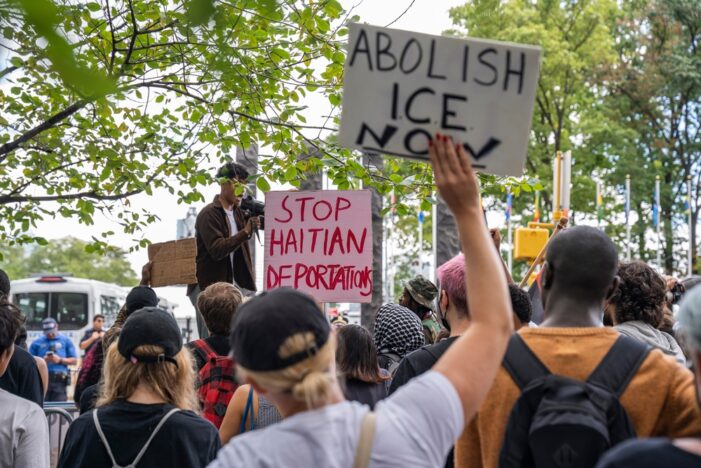By: Mary Campbell | Editorial credit: Luigi W Morris / Shutterstock.com
Brooklyn’s Little Haiti is experiencing heightened fear and uncertainty as federal immigration policies shift, particularly regarding Temporary Protected Status (TPS) for Haitian nationals. The neighborhood, long recognized as a hub of Haitian culture and resilience, is now gripped by anxiety over potential deportations, community disruption, and the humanitarian consequences of returning individuals to an unstable Haiti. This summary outlines the key issues, community responses, and broader implications of these developments.
1. Context & Background
Little Haiti is a neighborhood in Brooklyn, home to a significant Haitian immigrant community. Many community members live under Temporary Protected Status (TPS), a program that allows people from countries facing crises (natural disasters, political instability, etc.) to reside and work legally in the U.S. because return to their home country is unsafe.
2. Change in Federal Policy
The Trump administration announced in February 2025 the plan to end TPS protections for Haitian nationals, with legal status for many to expire in August 2025. In addition, there have been enhanced immigration enforcement actions (including ICE raids) under the administration.
As of September 2025, the Department of Homeland Security (DHS) announced the termination of Haiti’s Temporary Protected Status (TPS), initially set to take effect on September 2, 2025. However, the U.S. District Court for the Eastern District of New York blocked this termination, ordering that Haiti’s TPS cannot end before February 3, 2026. This ruling preserves protection from deportation and work authorization for Haitian TPS holders until that date. The extension provides Haitian nationals more time to prepare or pursue other forms of immigration relief. Nevertheless, uncertainty remains, as the federal government continues to seek ways to justify termination, and future outcomes may depend on ongoing litigation.
- Advertisement -
3. Effects & Reactions in the Community
Due to the fear of deportation, many Haitian immigrants—some with legal documentation and some TPS holders—are avoiding public spaces, staying off the streets, and reducing their visibility. Public life and business are being affected: decreased foot traffic, fewer customers, and reduced enrollment in community services (e.g., ESL classes) have been reported. There is substantial anxiety and uncertainty: people do not know whether enforcement actions will catch up with them; even those with legal status feel vulnerable.
4. Community Mobilization
Haitian community organizations, churches, and legal advocates have held protests and rallies, calling for the retention or restoration of TPS, and for clearer protections so families are not torn apart. There are efforts to inform people of their legal rights and to assist those at risk of losing status.
5. Legal & Humanitarian Risks
Ending TPS could render an estimated hundreds of thousands of Haitians undocumented overnight, exposing them to deportation. Haiti remains in crisis: political instability, gang violence, poverty, and weakened institutions raise serious humanitarian concerns about forcing returns.
6. Overall Implications
The developments in Little Haiti illustrate the profound effect immigration policy changes can have on entire communities. The fear of deportation undermines local economies, weakens social cohesion, and discourages civic participation. Families face the threat of separation, while schools, businesses, and community organizations experience reduced engagement. If TPS protections are not extended or alternative pathways to status are not provided, the Haitian community in Brooklyn—and other Haitian enclaves across the U.S.—may see long-term declines in stability, health, and economic vitality. This situation underscores the urgent need for policies that balance immigration enforcement with humanitarian protection.


